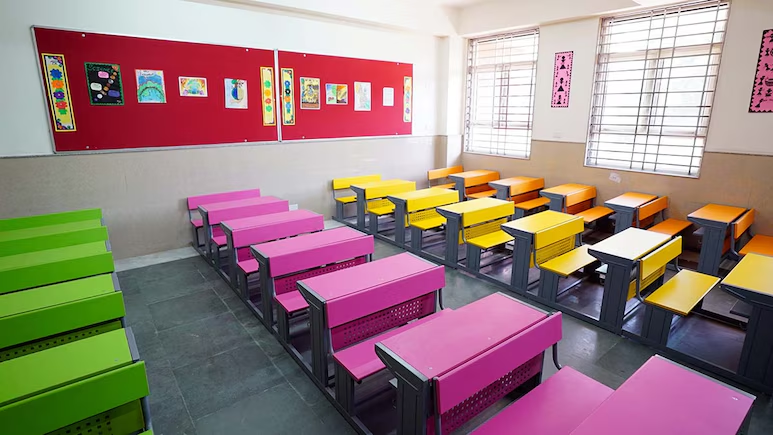
The world we are living in and the world we know is rapidly changing. This tsunami of change will happen so fast that people will be caught unawares. This will be ushered in by two main pillars: Artificial Intelligence and Automation. The jobs that will get redundant will mostly be lower-end. Any job that is repeatable will be done by a machine or a BOT.
Let's look at an example that most have experienced. The way we check-in at the airport has seen a sea change in the last five years. We used to stand in a queue with paper tickets to get a boarding pass and then board a flight. Today we check-in online, get the boarding pass on the mobile and at many airports, we just show the QR code and board the flight. What happened to all the staff at the counters?
My house help left to cast his vote in the West Bengal elections. I went to the store to see the automatic floor cleaners. A fully automatic cleaner with a mop was priced at Rs 40,000. About 25 per cent of a domestic worker's work is cleaning the house. One can clearly see how the cost of automation has reduced so much.
Detroit was an automobile hub for the world. Earlier the Detroit auto workers had huge clout, and they were the highest-paid workers. 92 employees were needed in the 1930s to assemble a car. This was brought down to 30 employees in 2010. Today, the Jeep plant needs just 13.57 employees to assemble a car. What's interesting is in the past 10 years there has been more than 50 per cent reduction in employees.
COVID-19 has become a catalyst in accelerating this tsunami of what I call AAI: Automation and Artificial Intelligence. The lockdown has forced many workers to go home or work from home, and people have quickly found alternatives to human labour.
The world needs to be reskilled and this needs to be done fast. India employs 500 million people of whom about 200 million will need reskilling. Employing over 40 per cent of the total population, agriculture is another area where we will see massive farm automation. This could potentially displace over 60-80 million workers.
According to a tea planter friend of mine, the rule of thumb was that a 100-acre tea estate needed 100 workers. Now with semi-automatic machines, this has come down to 60 and if he goes in for full automation, the requirement will come down even further. There are massive opportunities that these people can be reskilled and gainfully employed elsewhere.
India's food waste estimated at about Rs 92,000 crores annually can be addressed to turn this into a sunrise industry. For example, 2.2 million tons of tomatoes go to waste. If we can convert these tomatoes to sun-dried tomatoes and work on precision agriculture, this will double the farmers' income even while employing more people.
The industry employs about 25 per cent of India's total workforce. The introduction of robotics and interconnecting machines will displace nearly 30-40 million people. Industry 4.0 will bring in many new opportunities but the current workforce is ill-equipped to contribute unless they are reskilled.
The emerging industries of the future are green jobs and electric cars. But AICTE [All India Council for Technical Education, the country's premier technical education accreditation body is yet to approve a course on electric mobility. For the industry to accelerate the pace, it needs to induct fresh talent that is skilled to participate in the high-end mobility labs that will need to be set up. India needs to create centres of excellence in a variety of emerging areas.
The service sector will have to wake up and reskill 70 million people. Here, more jobs will be displaced by BOTS and Robotic Process Automation. There is a massive opportunity for the service sector to help in the skilling journey. COVID-19 has ushered in digital learning in a big way. Online training, including skill-oriented training too, is a big opportunity for the service industry to take up.
The problem in India will be more acute as we have stunted learning. As a nation, we have never had a culture of continuous learning. An engineer who graduated in 2000 did not learn the Internet of Things (IoT). The same engineer in Germany or the US, for example, will have to continue professional education and complete certification courses every year.
The Government needs to employ task forces locally and create self-help groups. Our current model of having industry sector skill councils as a central body is not rooted in reality.
HireMee, a company I founded, is among the 10 qualified teams in the $5 million US XPRIZE for Rapid Reskilling competition. There we are aligned to MassHire, a Workforce Development Board (WDB) in Massachusetts. The competition entails us to work with WDBs and industry and reskill people using digital technologies like AR or VR and reduce the time to skill by half at no cost to the employee.
India needs similar initiatives to rethink how we are going to handle our future workforce. And it has to be done quickly. Is our workforce ready for the automated robotic world? This will singularly make or break India. This needs all the stakeholders to come together to help shape the future of India.
Chocko Valliappa is a CEO of Vee Technologies and HireMee and Vice Chairman, Salem-based Sona group of education institutions
Disclaimer: The opinions expressed within this article are the personal opinions of the author. The facts and opinions appearing in the article do not reflect the views of NDTV and NDTV does not assume any responsibility or liability for the same.

